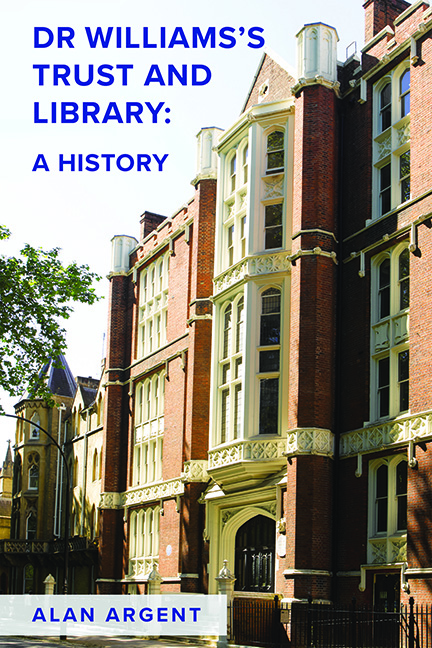Book contents
- Frontmatter
- Dedication
- Contents
- List of Illustrations
- Foreword
- Preface
- Abbreviations
- Notes on Dates, Money, Welsh Place Names and Publications
- Prologue
- 1 Dr Williams and His Will
- 2 Benjamin Sheppard, Receiver 1721–31: Faith, Fitness, and Diligence
- 3 Constructing the Library Building 1725–30: A Proper Plan
- 4 Francis Barkstead, Receiver 1731–47: Piety and Charity
- 5 John Cooper, Receiver 1748–62: Liberty and Liberal Dissent
- 6 Richard Jupp junior, Receiver 1762–95: A Very Respectable Body
- 7 Richard Webb Jupp, Receiver 1795–1850, and David Davison, Receiver 1850–7: Fashionable Sympathies Amid Increasing Light
- 8 Walter D. Jeremy, Receiver 1857–93: The Scrupulous Observer
- 9 Francis H. Jones, Secretary and Librarian 1886–1914: Introducing Order
- 10 Robert Travers Herford, Secretary and Librarian 1914–25: Application and Imagination
- 11 Stephen Kay Jones, Librarian 1925–46, and Joseph Worthington, Secretary 1925–44: A New Age with Old Strains
- 12 Roger Thomas, Secretary 1944–66 and Librarian 1946–66: Trusted Innovator
- 13 Kenneth Twinn, Secretary and Librarian 1966–76: Modest Dependability
- 14 John Creasey, Librarian, and James McClelland, Secretary, 1977–98: Mixed Blessings
- 15 David Wykes, Director 1998–2021: Past, Present, and Future
- 16 Dr Williams’s Trust: An Assessment
- Appendix 1 Trustees in 1723
- Appendix 2 Lists from Short Account (with later additions)
- Bibliography
- Index
7 - Richard Webb Jupp, Receiver 1795–1850, and David Davison, Receiver 1850–7: Fashionable Sympathies Amid Increasing Light
Published online by Cambridge University Press: 26 May 2022
- Frontmatter
- Dedication
- Contents
- List of Illustrations
- Foreword
- Preface
- Abbreviations
- Notes on Dates, Money, Welsh Place Names and Publications
- Prologue
- 1 Dr Williams and His Will
- 2 Benjamin Sheppard, Receiver 1721–31: Faith, Fitness, and Diligence
- 3 Constructing the Library Building 1725–30: A Proper Plan
- 4 Francis Barkstead, Receiver 1731–47: Piety and Charity
- 5 John Cooper, Receiver 1748–62: Liberty and Liberal Dissent
- 6 Richard Jupp junior, Receiver 1762–95: A Very Respectable Body
- 7 Richard Webb Jupp, Receiver 1795–1850, and David Davison, Receiver 1850–7: Fashionable Sympathies Amid Increasing Light
- 8 Walter D. Jeremy, Receiver 1857–93: The Scrupulous Observer
- 9 Francis H. Jones, Secretary and Librarian 1886–1914: Introducing Order
- 10 Robert Travers Herford, Secretary and Librarian 1914–25: Application and Imagination
- 11 Stephen Kay Jones, Librarian 1925–46, and Joseph Worthington, Secretary 1925–44: A New Age with Old Strains
- 12 Roger Thomas, Secretary 1944–66 and Librarian 1946–66: Trusted Innovator
- 13 Kenneth Twinn, Secretary and Librarian 1966–76: Modest Dependability
- 14 John Creasey, Librarian, and James McClelland, Secretary, 1977–98: Mixed Blessings
- 15 David Wykes, Director 1998–2021: Past, Present, and Future
- 16 Dr Williams’s Trust: An Assessment
- Appendix 1 Trustees in 1723
- Appendix 2 Lists from Short Account (with later additions)
- Bibliography
- Index
Summary
That the new receiver in 1795 was closely related to his predecessor underlined that the trustees were unwilling to place confidence in those not already known to them. Although nineteenth-century English Christianity was overwhelmingly evangelical, DWT was now synonymous with Unitarianism, lending it a sectarian character. Following the critical report of the Commission of Inquiry into the State of Education in Wales, DWT's schools were reformed and improved.
Richard Webb Jupp and the Trustees
Richard Jupp, the receiver, resigned in July 1795. Dying four years later, he was buried in Bunhill Fields, having been succeeded in December 1795 by his nephew and namesake the attorney, Richard Webb Jupp (1767–1852). Fourteen years later Webb Jupp had so established himself that the trustees readily acceded to his request for an increase in salary of an extra £20 a year, at the same time granting the secretary £10 more annually. In 1842 Webb Jupp was living at Carpenters’ Hall, London Wall, having also served since 1798 as clerk to the Carpenters’ Company, of which his uncle had once been master. If the taint of nepotism coloured his appointment to DWT, he was to prove a skilful and capable administrator.
In 1798 Rochemont Barbauld (c. 1749–1808) and in 1801 Thomas Belsham became trustees. Belsham had succeeded Priestley as minister of the Gravel Pit Chapel, Hackney in 1794 and eleven years later followed Disney as minister of the ‘most fashionable’ Essex Street Chapel. After Lindsey and Priestley, Belsham was the principal advocate of unitarianism. Perhaps sensitive to criticism, the trustees ruled in 1807 that, as regards laymen, ‘two Trustees of the same family’ might not serve concurrently, although at their next meeting this resolution was rescinded. In 1809 the trustees discussed the issue of canvassing for a seat on DWT, concluding that such conduct tended ‘to destroy the independence, to degrade the dignity and to disturb the harmony of the Society’. Had such canvassing already occurred?
The fact that those dissenters in London, with approved theological views, were few in number led to awkwardnesses in recruitment, although their circle was fashionably sympathetic to political radicalism.
- Type
- Chapter
- Information
- Dr Williams's Trust and Library , pp. 110 - 142Publisher: Boydell & BrewerPrint publication year: 2022



